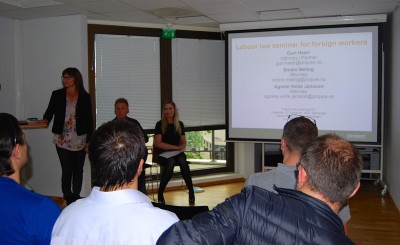STAVANGER: At least two members of the sombre seminar audience were holding hands, while others sought comfort in some gallows humour. All of them, expats who’ve been working in Norway’s hard-hit oil and gas industry but now face unemployment, seemed relieved to finally be getting some answers to their many questions from a Stavanger law firm that recognized the need for help.

“This is the first time we have held a seminar to focus on these issues (facing foreign workers),” said Guri Haarr, attorney and partner at law firm Projure, which specializes in business and labour law. From their base in Norway’s oil capital of Stavanger, Projure’s attorneys have seen the toll that the dive in oil prices has taken on oil and oil supply companies in their home region. They’ve advised business clients caught in the downsizing process, and saw a need for employees to be advised of their legal rights as well.
Expatriate employees can end up in an even scarier situation when they lose their jobs in Norway. For them, it can mean they’ll have to uproot and leave the country given the difficulty many foreign workers have finding jobs and the fact that a large number don’t qualify for unemployment benefits like their Norwegian colleagues do, either.
So Haarr and her colleagues Sindre Meling, Agnete Velde Jansson and Benjamin Törnroos decided to do something about that. At the first of two free seminars held at their office in downtown Stavanger this week (the second was set for Thursday evening, at 6pm), they helped guide the non-Norwegians facing layoff through the bewildering and often traumatic process attached to losing a job in Norway. The seminar, which was free of charge, highlighted the laws that regulate the downsizing process in Norway, how employers can select who goes and who stays, what benefits may be available and how employees can best prepare for such things as “consultation meetings” – the dreaded call to a meeting at which they’re informed about the potential for their jobs disappearing.

There are strict rules governing the process in Norway, and employees have a right to challenge a dismissal that may be found invalid by a court. “It’s important to know what rights your employer has and what rights you have,” Meling told his audience of geologists, engineers and other oil industry workers from Canada to India.
If employers don’t invite to a “consultation meeting,” for example, it’s likely a subsequent dismissal would be ruled invalid, Meling said. Employers also have to justify the downsizing, with loss of contracts and orders mostly behind the circumstances that would make job reductions valid these days. All companies with more than 50 employees also must involve employees’ elected representatives in the process, also regarding who actually gets targeted for layoff.
The selection process for who gets targeted can be the most difficult, because of criteria that can be seen as subjective. Expertise can prevail over seniority, “but this is difficult for the employer,” Meling said. “It’s the most challenging part of the process.” It also can be an area most likely to be challenged. The question is how “expertise” can be defined, and some members of the audience wondered whether Norwegians can prevail over foreign workers, because, for example, their Norwegian language skills are better. Not necessarily in a company where English has been the working language, Haarr said. In companies set to become much smaller and more locally oriented, though, Norwegian employees may win a legal edge over their foreign colleagues. “It may seem unfair, but it may happen,” said Törnroos.
Can influence the process
Those gathered for the seminar were told that they can have an influence on an employers’ decision regarding who goes and who stays. The most important thing, Meling stressed, is to be well-prepared for the first meeting with the downsizing employers. “Make sure your employer knows everything about you that may prove relevant when making a decision,” he said. It’s within the employees’ rights to request documentation, or discuss the negative effects that dismissal would have on him or her (if, for example, the employee is a single parent or sole wage earner in the family). Employees can bring an “adviser” with them to the meeting, be it a union representative, a friend or colleague, or a lawyer. Meling cautioned that “engaging a lawyer is quite costly,” but in some cases employers can be persuaded to cover those costs.
Haarr concentrated on what employees can do once they receive dismissal notices, and how some can be challenged. She said that employers must go along with demands for negotiations. “They can lead to an amicable solution,” she said, stressing that specific time limits apply. Laid-off employees have a right to remain in their jobs at full pay for as long as negotiations continue.
Haarr noted that employees can also demand to know how selection criteria has been applied and whether there may be other “suitable work” for them in the company, in the hopes of being reassigned. If all else fails, compensation may be awarded but is likely to be modest. “We are not in the United States of America,” she noted, a reference to the huge amounts of compensation often awarded by US courts.
‘Pretty harsh’ rules
Attorney Agnete Velde Jansson, who formerly worked for Norway’s state welfare agency NAV, addressed the “security net” that Norway has for laid-off workers, although it doesn’t always extend to foreign workers. The system is “very complex,” she said, and confirmed how expertise from abroad often leaves foreign workers with residence permits tied to a specific skill or employer. If the job disappears, the worker may not be viewed as a “genuine job seeker” open to all jobs available. In other cases, foreign employees have paid income tax to Norway but not the premiums automatically deducted from Norwegian workers’ wages for membership in Norway’s National Insurance scheme, which in turn qualifies them for unemployment benefits.
“The rules can be pretty harsh, really,” said Jansson, who once had to administer them herself. And even when foreign workers do qualify for benefits, they’ll find they only amount to a relatively small portion of the laid-off worker’s previous salary, plus some extra nominal payments if the worker has children. “Enough for a banana a day,” joked one member of the audience. “And no bananas allowed on the weekend,” chimed in another.
“I think it was really nice the law firm did this, and I thanked them for it,” one Canadian geologist for a major oil company said after the seminar. The lawyers, who got a round of spontaneous applause for their efforts, acknowledged they were reaching out to the foreign workers with an eye to attracting more clients. Mostly, they contended, they simply saw a need for information within a part of the Norwegian workforce that often gets overlooked and lacks a voice in Norwegian media. Its members can be even more confused and traumatized by the loss of a job in Norway, simply because they’re far from home.
newsinenglish.no/Nina Berglund

